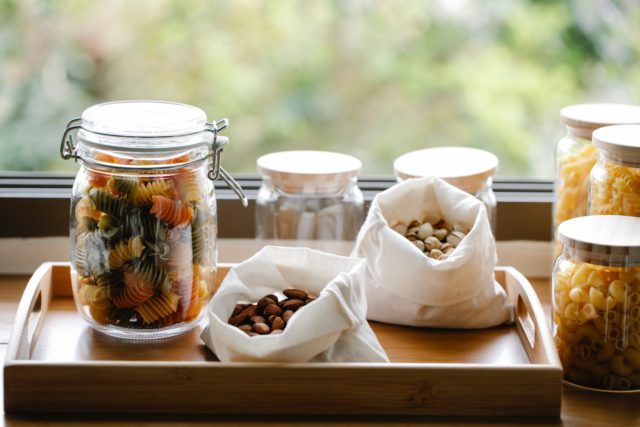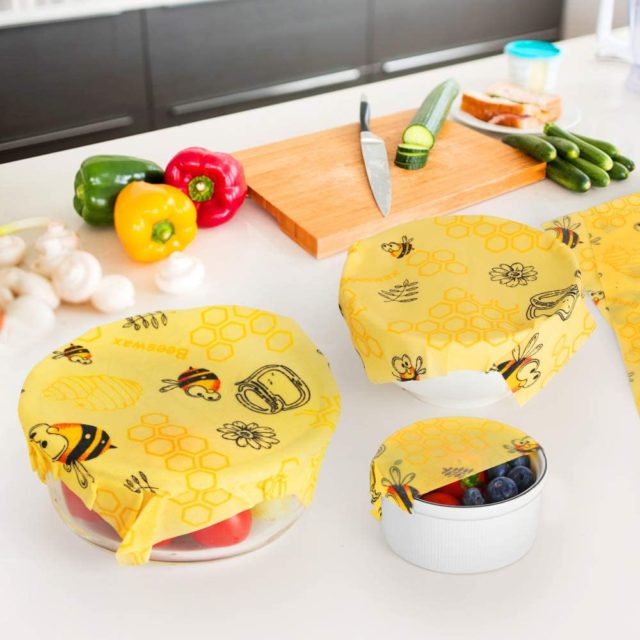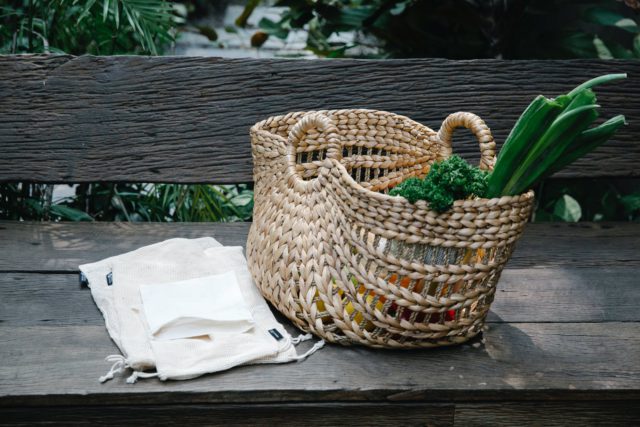Zero-waste food storage is one of the top considerations when it comes to a non-toxic and eco-friendly kitchen. When it comes to food containers, we have to face many options, glass, plastic, or silicone. The choice today depends on the health and environmental concerns, space and weight considerations, and functionality. Below, we’ve outlined the factors to consider when choosing the best materials for healthy and eco-friendly food storage.
Related: Seasonal Fruits and Vegetables – Good Choice for the Environment
Glass jars
You are right if you are looking for the benefits of glass (safety, long-lasting, eco-friendly) for food storage. Great for chilling and freezing smoothies, soups, jams, and more. or for storing anything in your pantry, glass jars are one of the zero waste food containers you should opt for. The most sustainable option is to use the jars you already have from sauces, nut butter, and other foods in glass from the store.
Glass jars not only make food look appealing, but they’re also safe, cheap, eco-friendly, and versatile. Use large jars for cereal and flour, medium jars for salads, and small jars for disposable desserts or ready-to-eat breakfast items. They are best used for storing dry or liquid goods, chilled/frozen foods.

Silicone Bag
Reusable silicone bags are so many people’s favorite plastic-free food preservation option! The premium silicone bag can be safely placed in the freezer, microwave, oven or dishwasher. Plus, they’re transparent so you can always see what’s in them without having to open each bag. They are best used for storing snacks, leftovers, frozen produce and anything else you want to put in a bag.
Reusable Food Hugger
Food Huggers have become the hero of your zero-waste kitchen with their versatility and functionality. Great for sealing half-eaten avocados and apples or even watermelons, or covering jars where you’ve lost the lid. Food Hugger will be your trusted companion in your quest to reduce food waste. They are often used to preserve cut products, cover jars without lids.
Stainless steel container
For ultra-durable, 100% plastic-free storage, the stainless steel carrying case is the perfect match. Regardless of the size you need, you can find these zero-waste food containers in a variety of sizes, from 8 to 26 cm. The only problem you may have with stainless steel containers is that it’s easy to forget what you actually put in them, so it’s best to use them to make lunch boxes rather than use them to store lots of food in the refrigerator.
However, to solve the problem that stainless steel containers often appear when they don’t know what’s inside, some suppliers have stainless steel containers with transparent silicone lids.
Reusable Food Wraps
Sometimes you need to cover food without transferring it to the storage bin. A more eco-friendly alternative to plastic wrap and aluminum foil is beeswax wrap. Reusable food wrapping paper is a minimal, earth-friendly, and more versatile form of food storage.
The beeswax wraps are flexible enough to mold around the mouth of a bowl or fold into transportable snack bags. Most importantly, they can be washed and used over and over again. You can use them to wrap around sandwiches, half-eaten avocados, or freshly baked cakes. Most Food Wraps are made with beeswax, but you can still find reusable vegan food wrap options made from cotton fabric, well-sourced soy wax, jojoba and coconut oils, and resins. tree.

Bamboo storage jars
With containers made from recycled bamboo and lids made from renewable cork, these jars are the ultimate eco-friendly food storage. The small jar set is great for storing snacks like nuts and dried fruit. Their large jars are ideal for storing flour, sugar, or other dry goods.
BPA-free reusable plastic containers
Reusable plastic containers are definitely a convenient option for transporting food. They are much lighter than glass and won’t break into millions of tiny pieces if you drop them. The collapsible container is appreciated for its compact food storage capacity for carrying rice, camping, or traveling. When you’re thinking about path and flexibility, plastic is the winner.
Organic fabric production bags
Safe for your food and better for the planet, organic cotton produce bags are a great way to take with you to the market and store fresh produce like carrots, apples, and broccoli without the hassle. need to use plastic bags. When made from organic cotton, canvas bags are safe for food storage and transportation and washable and biodegradable. It provides a dark and dry environment to keep vegetables fresh and is made from woven plant fibers.

Conclusion
Choosing plastic-free food storage is not only safer for you and your family, but it also helps reduce your ecological footprint and even saves money in the long run. With the growing number of low-waste storage options available, it can be difficult to choose the right one for you. So, hope this guide helps you choose the best reusable food storage options available and what they are best used for that meets strict sustainability standards.
